
The aim of this book series, sponsored by the BSHP and published by Oxford University Press is to encourage and facilitate the study of all aspects of the history of philosophy, including the rediscovery of neglected elements and the exploration of new approaches to the subject. Texts are selected on the basis of their philosophical and historical significance and with a view to promoting the understanding of currently under-represented authors, philosophical traditions, and historical periods. They include new editions and translations of important yet less well-known works which are not widely available to an Anglophone readership. The series is managed by an editorial team elected by the Society. It reflects the Society’s main mission and its strong commitment to broadening the canon.
Editors:
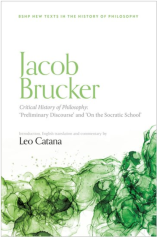
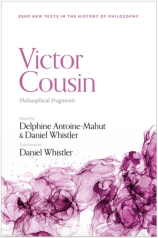

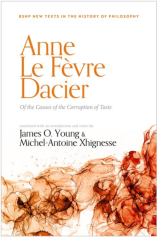
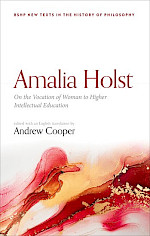
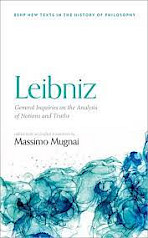
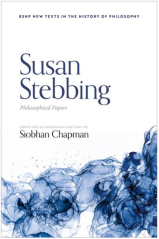
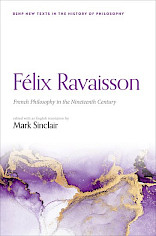
Jacob Bruckner: Critical History of Philosophy: Preliminary Discourse and The Socratic School, edited by Leo Catana. Oxford: Oxford University Press, 2024. View on OUP website
It is well known that philosophy has a history that spans over more than two thousand years. It is less known, however, that the discipline narrating philosophy's past emerged much later, namely in the 18th century. That new discipline was called 'history of philosophy'. The German historian and theologian Johann Jacob Brucker (1696-1770) had a decisive influence upon the formation of this new discipline through his Latin work Historia critica philosophiae (Critical history of philosophy), which was first published in 1742-1744, and which came out in a second edition in 1766-1767. To Brucker it was paramount to define history of philosophy as a philosophical discipline, and not merely as a historical discipline. In order to achieve this, it was vital to define the new discipline's object and explain which material should be included or excluded, and it was crucial to define an interpretative and philosophical method to be deployed on the material selected. Brucker's Historia provided these definitions in the opening chapter, in the present volume translated as the 'Preliminary Discourse', where he also outlined a global scheme of periodization and geographical regions. Moreover, he put his own precepts to practice in the remaining part of the work, which accounted for what he regarded as a global history of philosophy from the beginning of the world up till his own times. The second chapter translated in the present book, 'The Socratic School', illustrates the hermeneutical consequences of the method laid down in the 'Preliminary Discourse', but it also offers a unique insight into the 18th-century understanding and evaluation of Socrates.
In quantitative terms, Brucker's Historia was the most extensive account of philosophy's past produced in the 18th century. It was cited and paraphrased in the most authoritative encyclopaedias and histories of philosophy produced in Europe in the 18th and 19th centuries, and its key concepts were often transferred to histories of philosophy produced outside Europe. For this reason, Brucker's Historia has exerted an enormous influence upon historical consciousness among Europeans, but also among peoples living outside Europe. The present book provides first-time English translations of parts of Brucker's work.
Victor Cousin: Philosophical Fragments, edited by Delphine Antoine-Mahut and Daniel Whistler, translated by Daniel Whistler. Oxford: Oxford University Press, 2025. View on OUP website
The first English translation of some of Victor Cousin's most important philosophical writings for over 150 years, accompanied by extensive contextual and analytic resources from a team of internationally recognized Cousin scholars
Victor Cousin was a towering philosophical figure of the nineteenth century: no French philosopher since has fully escaped his shadow. This edition of Philosophical Fragments brings together a series of Cousin's most accessible and significant texts to introduce English-language readers to his thought, along with commentaries on his relationship to Cartesianism, his role in the invention of the historiography of philosophy, as well as his lasting institutional legacy
The edition includes many of Cousin's most significant shorter pieces, such as his 1826 Preface to Philosophical Fragments, the 'manifesto' by means of which he relaunched the French spiritualist project and set out his own eclectic project in the history of philosophy; his 1833 Preface to Philosophical Fragments, in which he responds to mounting criticism of his version of spiritualism by setting out definitively his relations to Descartes, eighteenth-century sensualism, German Idealism, and Catholic theology; and a selection of the Fragments themselves, charting the genesis of his philosophy from the 1810s to the 1840s.
Johann Gottlieb Fichte: The Doctrine of the State, edited by Jeffrey Church and Anna Marisa Schön. Oxford: Oxford University Press, 2025. View on OUP website
The Doctrine of the State is a major work of political philosophy and philosophy of history by one of the most important authors of German Idealism, Johann Gottlieb Fichte. It represents Fichte's final sustained attempt to provide a synoptic overview of his entire system, including a summary of his famously evolving Wissenschaftslehre. The work's overriding concern is with founding the rule of reason in an irrational world. Fichte provides a synoptic account of human history from the dawn of humanity, through the ancient world, and into a modern world governed by a kind of secularized Christianity. His account of humanity's development is one that involves the struggle between faith and reason. Fichte's philosophical analysis of history can be compared to other important works of this period, including works by Friedrich Schelling and G. W. F. Hegel. Written against the backdrop of Napoleon's disastrous defeat in Russia in 1813, the book also revisits the question of the nature and purpose of nationhood and conflict among peoples that Fichte had originally pursued in his important nationalist work, the Addresses to the German Nation. This edition also contains translated excerpts from Fichte's 1813 diary, where his fiery republican resistance to tyranny at home and abroad appear most clearly.
Anne Le Févre Dacier: Of the Causes of the Corruption of Taste, edited by James O. Young and Michel-Antoine Xhignesse. Oxford: Oxford University Press, 2025. View on OUP website
Anne Le Fèvre Dacier (1645-1720) was the most important woman of letters of her time and Of the Causes of the Corruption of Taste is her most significant work. This book is one of the wellsprings of modern aesthetics. While Dacier was a classical philologist—not an aesthetician or philosopher of art—in several ways she anticipated and laid the groundwork for subsequent writers on the fine arts, including Batteux and Du Bos, both of whom cite her. Her views on art are at least as sophisticated and interesting as those found in contemporaries such as Addison and Shaftesbury or anyone in France. Dacier addresses topics that would become staples in the philosophy of art, in many cases long before other writers did. She contributed to the demise of the rationalist approach to art criticism and to the rise of the view that the beauties of art are apprehended by means of experience, a view which came to dominate eighteenth-century thinking about the arts.
Dacier was one of the first eighteenth-century authors to emphasize that art is essentially the imitation of nature and belle nature. She raised questions about whether art can be a source of moral knowledge long before this became a widely discussed question in the philosophy of art. She richly deserves a prominent place in the early history of aesthetics. This volume is the first-ever translation of a work by Dacier into English. It includes a substantial introduction that not only examines her contributions to the philosophy of art but also traces her influence on the development of the subject through the eighteenth century.
Amalia Holst: On the Vocation of Woman to Higher Intellectual Education, edited, translated and introduced by Andrew Cooper. Oxford: Oxford University Press, 2023. View on OUP website
This edition offers the first English translation of Amalia Holst's daring book, On the Vocation of Woman to Higher Intellectual Education (1802). In one of the first works of German philosophy published under a woman's name, Holst presents a manifesto for women's education that centres on a basic provocation: as far as the mind is concerned, women are equal partakers in the project of Enlightenment and should thus have unfettered access to the sciences in general and to philosophy in particular.
Holst's manifesto resonates with the work of several women writers across Europe, including Olympe de Gouges, Mary Wollstonecraft, and Germaine de Staël. Yet in contrast to the early works of feminism we celebrate today, her book had little success. Its reception confronts us with a darker side of the German Enlightenment that, until recently, has been neglected. Holst sought to unearth the gendered nature of the fundamental concepts of the Enlightenment—including vocation, education, and culture—which enabled men to establish the subordinate status of women by philosophical means. However, her argument was scorned by male reviewers, who denied the very possibility of a woman philosopher
With an introduction by Andrew Cooper, and translations of biographical material and early reviews, this edition provides students and scholars of German philosophy with a timely resource for developing a richer understanding of their field, and general readers with a powerful early feminist text that reveals the opportunities and difficulties facing women philosophers at the turn of the nineteenth century.
Gottfried Wilhelm Leibniz: General Inquiries on the Analysis of Notions and Truths, edited, translated and introduced by Massimo Mugnai. Oxford: Oxford University Press, 2020. View on OUP website
In General Inquiries on the Analysis of Notions and Truths, Leibniz articulates for the first time his favourite solution to the problem of contingency and displays the main features of his logical calculus. Leibniz composed the work in 1686, the same year in which he began to correspond with Arnauld and wrote the Discourse on Metaphysics. General Inquiries supplements these contemporary entries in Leibniz's philosophical oeuvre and demonstrates the intimate connection that links Leibniz's philosophy with the attempt to create a new kind of logic.
This edition presents the text and translation of the General Inquiries along with an introduction and commentary. Given the composite structure of the text, where logic and metaphysics strongly intertwine, Mugnai's introduction falls into two sections, respectively dedicated to logic and metaphysics. The first section ('Logic') begins with a preliminary account of Leibniz's project for a universal characteristic and focuses on the relationships between rational grammar and logic, and discusses the general structure and the main ingredients of Leibniz's logical calculus. The second section ('Metaphysics') is centred on the problem of contingency, which occupied Leibniz until the end of his life. Mugnai provides an account of the problem, and details Leibniz's proposed solution, based on the concept of infinite analysis.
Susan Stebbing: Philosophical Papers, edited by Siobhan Chapman. Oxford: Oxford University Press, 2024. View on OUP website.
Susan Stebbing (1885-1943) was an important figure in the development of analytic philosophy. She was author of the ground-breaking work A Modern Introduction to Logic (1930), critic of what she saw as the inaccuracies in terminology and method of many of her most celebrated contemporaries, and originator of the concept of 'directional analysis', which was foundational to the 'Cambridge' school during the 1930s. She was also a leading proponent of public philosophy, and in books such as Philosophy and the Physicists (1937) and Thinking to Some Purpose (1939) she wrote for a general readership, exposing the dangers of misleading phrasing and implicit ideologies in the language used by authority figures such as scientists, politicians, and religious leaders. This volume is the first published selection of Stebbing's writings, bringing together sixteen papers from across the span of her thinking. The papers are grouped thematically into four parts, on 'Logic', 'Science', 'Analysis' and 'Ideology'. In the Introduction, Siobhan Chapman presents an overview of Stebbing's work and an account of the significance of each of the selected papers, and extensive notes offer the reader the opportunity to engage with the published works referred to in the papers. The volume includes a bibliography of Stebbing's numerous publications.
Félix Ravaisson, Nineteenth-Century French Philosophy, edited, translated, and introduced by Mark Sinclair. Oxford: Oxford University Press, 2022. View on OUP website
Félix Ravaisson's French Philosophy in the Nineteenth Century is one of the most influential and pivotal texts of modern French thought. Commissioned by the Minister of Public Instruction as one of a series of reports to record the progress of the French sciences and humanities for Paris' second world fair, the 1867 Exposition universelle d'arts et d'industrie, it was published with the others the following year. In the report Ravaisson argues, with verve and generosity, and with an unparalleled command of the century's intellectual developments, that the myriad voices in nineteenth-century French thinking were beginning to form a chorus, one that was advancing towards a new, more concrete form of spiritualist philosophy able to resist materialist, mechanist and sensualist doctrines while incorporating recent developments in the life-sciences. As Henri Bergson noted, it effected a "profound change of orientation in university philosophy" and for decades afterwards students learnt its concluding sections by heart in order to pass public examinations. Bergson's own Creative Evolution, which made him the world's most celebrated living philosopher at the end of the long nineteenth century, is, with its psychological interpretation of biological evolution, a direct expression of the new philosophical orientation that Ravaisson had divined in the report.
